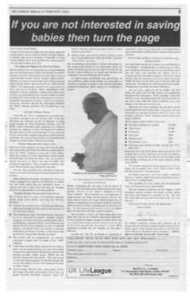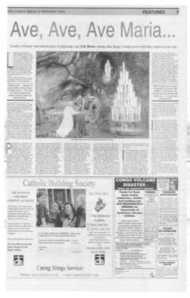Page 1, 8th February 2002
Page 1

Report an error
Noticed an error on this page?If you've noticed an error in this article please click here to report it.
Tags
Share
Related articles
Cloning Condemned By European Union
Cardinal Urges Blair To Set Up Bioethics Body
Alton Slams 'imbalance' Of Bioethical Group
Boycott Call As Sainsbury Backs Cloning
Cloning Ban Welcomed
Bio-ethics group predicts Lords cloning whitewash
BY CHRISTINA WHITE
DELAYS in the publication of the findings of a parliamentary committee into cloning have prompted fears that they are "relentlessly biased".
Comment on Reproductive Ethics (CORE), the pro-life campaign group, suspects that the findings of the House of Lords Select Committee on Stem Cell Research, which is chaired by Anglican Bishop Richard Harries of Oxford, will be strongly in favour of permitting destructive experimentation on human clones The select committee was convened only after the Government forced changes to the law through the Houses of Parliament via an unamendable statutory instrument.
Peers voted overwhelmingly in favour of the changes, which permitted the practice of "spare-part" cloning, in return for the establishment of the select committee to scrutinise the implications.
The select committee was expected to report in January 2002, but publication of the final report has been delayed at least twice.
The report is now expected after the parliamentary recess
on February 18.
Josephine Quintavalle, spokeswoman for CORE said all the indications pointed to little more than a "wall-papering exercise".
She said that CORE regarded the findings as a fait accompli, and has also been fiercely critical of the scientific bias of the committee.
Mrs Quintavalle said: "My contention is that if you get 26 people knee-deep in embryonic stem-cell research then you are not going to get an objective view.
"Just one side of the scientific argument has been presented."
CORE insists the case for adult stem cell research, which would negate embryonic and therapeutic cloning. has not been properly or seriously considered.
Research published in the New Scientist on January 23 highlighted hugely significant breakthroughs in adult stem cell research by a team of scientists working at the University of Minnesota in the United States.
Cells found in the bone marrow of adults, dubbed multipotent adult progenitor cells (MAPCs) , were found to have the same potential and to be as versatile as embryonic stem cells.
The team also found that the adult stem cells had few of the adverse side effects that accompany the use of embryonic stem cells.
The report states that MAPCs can turn into "a riad of tissue types" but crucially do not form cancerous masses when injected into adults.
The discovery of the MAPC avoids the problems of immune rejection and will focus the debate, on whether embryonic stem cell is justified, from a scientific and not just a moral viewpoint.
The MAPC is being heralded as the "most important cell ever discovered".
Mrs Quintavalle told The Catholic Herald that on the last day of the oral hearings, a senior member of the select committee asked whether adult stem cells could be isolated and used in isolation.
She said: "It revealed worrying lacunae in the understanding of adult stem cell science and reflected blinding ignorance in relation to the results of ASCR."
CORE believes the select committee will reiterate "the importance of giving serious consideration to alternatives to embryonic stem cells, but otherwise there will be no significant alterations to the decisions taken in the House of Lords on January 22."
It describes the process as "an exercise in futility, aimed at reassuring the public that every due consideration had been taken on board".
Mrs Quintavalle said: "The committee has not been given a proper briefing. That is why CORE has issued its concerns in advance of the findings."
blog comments powered by Disqus















